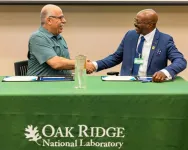(Press-News.org) Kashif Nawaz, distinguished researcher and section head for Building Technologies Research at the Department of Energy’s Oak Ridge National Laboratory, has been named a Fellow of the American Society of Mechanical Engineers, or ASME. The Fellow grade recognizes outstanding engineering achievements for members with 10 or more years of active practice.
Nawaz joined ORNL in 2016 as a research scientist in buildings equipment. He specializes in the heating, cooling and dehumidification systems of buildings including the development of novel heat exchangers and enhanced phase-change material processes. He has pioneered the development of additively manufactured next-generation heat exchangers made from metals, ceramics and polymer composites for a range of energy applications. Nawaz’s research has also led to the development of a new technology for the direct air capture of carbon dioxide using existing heating, ventilation and air conditioning equipment.
He has co-authored more than 200 publications including journal articles, conference papers and reports, and has more than 10 patents on thermal management processes. As a member of ASME, Nawaz has served as chair of the Heat Transfer Equipment and the Environmental Heat Transfer committees. He is regularly involved in the organization of ASME conferences including serving as program, track and session chair.
Prior to joining ORNL, Nawaz was a senior engineer in the Heat Transfer Center of Excellence at Johnson Controls. He currently holds a joint faculty appointment with The Bredesen Center for Interdisciplinary Research and Graduate Education at the University of Tennessee. Nawaz earned his doctoral degree in mechanical engineering from the University of Illinois at Urbana Champaign.
UT-Battelle manages ORNL for the Department of Energy’s Office of Science, the single largest supporter of basic research in the physical sciences in the United States. The Office of Science is working to address some of the most pressing challenges of our time. For more information, please visit energy.gov/science.
END
Nawaz named ASME Fellow
2024-09-18
ELSE PRESS RELEASES FROM THIS DATE:
U2opia signs license to commercialize anomaly-detection technology for cybersecurity
2024-09-18
U2opia Technology has licensed Situ and Heartbeat, a package of technologies from the Department of Energy’s Oak Ridge National Laboratory that offers a new method for advanced cybersecurity monitoring in real time. Situ, which discovers and understands otherwise-undetectable events by analyzing security data, will go to the market through a commercial license. The company will continue to explore opportunities for Heartbeat, which detects cyber attacks by focusing on the physical behavior of a protected device, through a research and development license.
U2opia Technology, a woman- and minority- led company, is directed by Maurice Singleton III, chief executive officer, ...
Explaining dramatic planetwide changes after world’s last ‘Snowball Earth’ event
2024-09-18
Some of the most dramatic climatic events in our planet’s history are “Snowball Earth” events that happened hundreds of millions of years ago, when almost the entire planet was encased in ice up to 0.6 miles (1 kilometer) thick.
These “Snowball Earth” events have happened only a handful of times and do not occur on regular cycles. Each lasts for millions of years or tens of millions of years and is followed by dramatic warming, but the details of these transitions are poorly ...
Cleveland Clinic study is first to show success in treating rare blood disorder
2024-09-18
Wednesday, September 18, 2024, CLEVELAND: A clinical trial has demonstrated that the cancer drug pomalidomide is safe and effective in treating hereditary hemorrhagic telangiectasia (HHT), a rare bleeding disorder that impacts more than 1 in 5,000 people worldwide. The trial, led by Keith McCrae, M.D., of Cleveland Clinic and supported by the National Institutes of Health, was stopped early because of these successful findings, and has been published in the New England Journal of Medicine.
The impetus for this trial was a single patient. About ...
Bone marrow cancer drug shows success in treatment of rare blood disorder
2024-09-18
A clinical trial supported by the National Institutes of Health (NIH) was stopped early after researchers found sufficient evidence that a drug used to treat bone marrow cancer and Kaposi sarcoma is safe and effective in treating hereditary hemorrhagic telangiectasia (HHT), a rare bleeding disorder that affects 1 in 5,000 people worldwide. The trial results, which are published in the New England Journal of Medicine, detail how patients with HHT given the drug, called pomalidomide, experienced a significant reduction in the severity of nosebleeds, needed fewer of the blood transfusions and iron infusions that HHT often demands, ...
Clinical trial successfully repurposes cancer drug for hereditary bleeding disorder
2024-09-18
A drug approved for treating the blood cancer multiple myeloma may offer a safe and effective way to reduce the risk of severe nosebleeds from a rare but devastating bleeding disorder. Hereditary hemorrhagic telangiectasia (HHT), the world's second-most-common inherited bleeding disorder, affects approximately 1-in-5,000 people and can have life-threatening complications, but there are currently no U.S. FDA-approved drugs to treat HHT. The PATH-HHT study, the first-ever randomized, placebo-controlled ...
UVA Engineering professor awarded $1.6M EPA grant to reduce PFAS accumulation in crops
2024-09-18
Associate professor of chemical engineering Bryan Berger received funding from the Environmental Protection Agency to reduce the impact of per- and polyfluoroalkyl substances, known as PFAS, in food and farming communities.
The award is part of the over $15 million the EPA granted to 10 institutions for PFAS reduction research, aimed at improving farm viability and increasing knowledge of PFAS accumulation.
Water sample collection for testing in Limestone, Maine. (Contributed photo)
Known as forever chemicals, PFAS are man-made substances that have been used in industry ...
UVA professor receives OpenAI grant to inform next-generation AI systems
2024-09-18
Superintelligence — AI systems that surpass human intelligence — could be just a decade away, raising urgent questions about how to ensure their safety and alignment with human values, according to OpenAI.
These AI systems could be hugely beneficial, but more sophisticated systems create the possibility for unpredictability. Misinterpreting human values or intent, algorithmic biases and security risks are all cause for concern, especially with highly developed AI systems where the potential consequences are far greater.
Yu Meng, assistant professor of computer science at ...
New website helps researchers overcome peer reviewers’ preference for animal experiments
2024-09-18
WASHINGTON, D.C.—A new website, AnimalMethodsBias.org, created by the Coalition to Illuminate and Address Animal Methods Bias (COLAAB), provides researchers guidance and resources aimed at helping them successfully publish nonanimal biomedical research by overcoming the preference some peer reviewers have for animal-based research methods.
“We recently found that half of researchers surveyed had been asked by reviewers to add an animal experiment to their otherwise animal-free study,” says Catharine ...
Can the MIND diet lower the risk of memory problems later in life?
2024-09-18
MINNEAPOLIS – People whose diet more closely resembles the MIND diet may have a lower risk of cognitive impairment, according to a study published in the September 18, 2024, online issue of Neurology®, the medical journal of the American Academy of Neurology. Results were similar for Black and white participants. These results do not prove that the MIND diet prevents cognitive impairment, they only show an association.
The MIND diet is a combination of the Mediterranean and DASH diets. It includes green leafy vegetables like spinach, ...
Some diabetes drugs tied to lower risk of dementia, Parkinson’s disease
2024-09-18
MINNEAPOLIS – A class of drugs for diabetes may be associated with a lower risk of dementia and Parkinson’s disease, according to a study published in the September 18, 2024, online issue of Neurology®, the medical journal of the American Academy of Neurology.
The study looked at sodium-glucose cotransporter-2 (SGLT2) inhibitors, which are also known as gliflozins. They lower blood sugar by causing the kidneys to remove sugar from the body through urine.
“We know that these neurodegenerative diseases like dementia and Parkinson’s disease are common and the number of cases is growing as the ...







